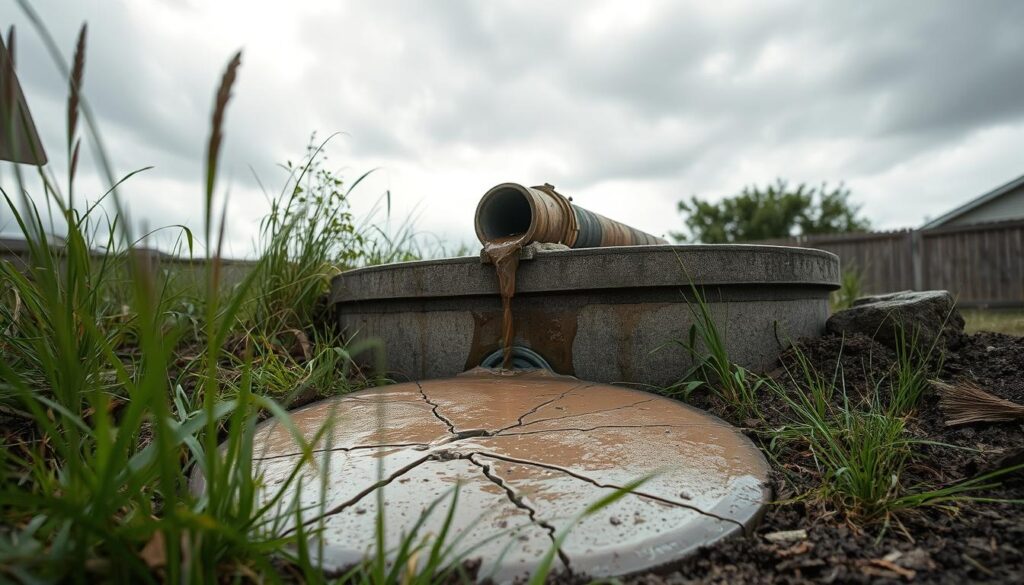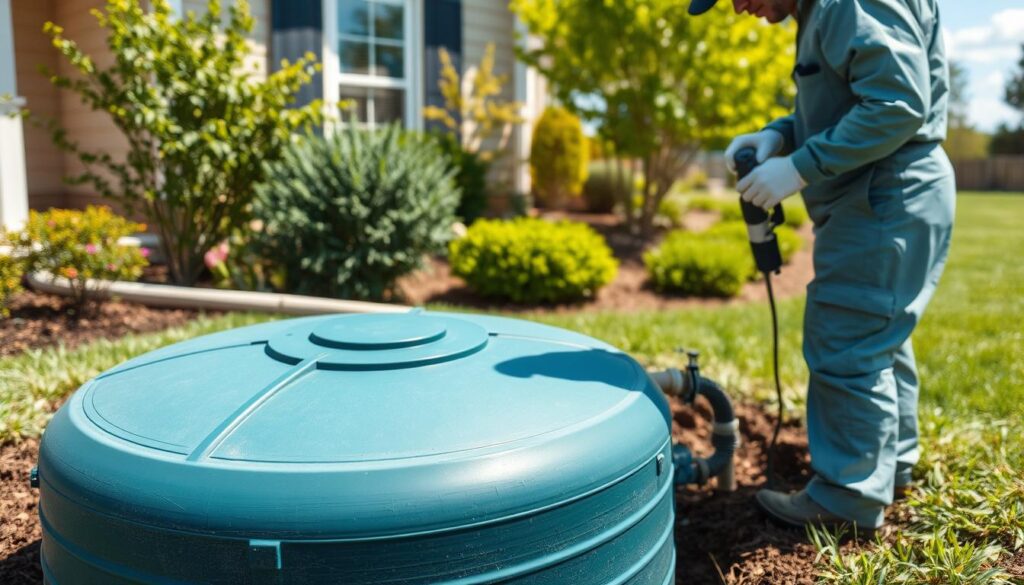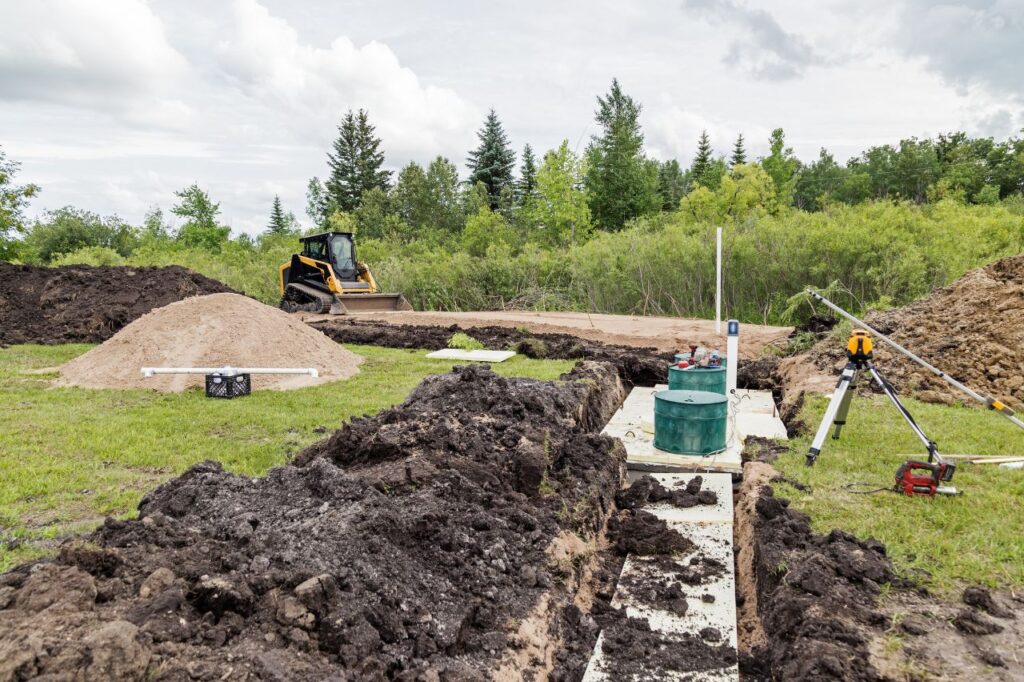The Most Common Septic Tank Issues and How to Resolve Them
Are you experiencing problems with your septic system, such as foul odors or slow drains? You’re not alone. Many homeowners face septic tank problems that can be frustrating and costly to repair.
Regular maintenance is key to preventing these issues, but what happens when problems arise? Understanding the common causes of septic tank issues can help you identify and resolve them before they become major concerns.

Homeowners often encounter issues like pooling water in the yard, which can be a sign of a more significant problem. By learning how to address these issues, you can save time and money while ensuring your septic system operates efficiently.
Key Takeaways
- Regular maintenance is crucial for preventing septic tank problems.
- Foul odors, slow drains, and pooling water are common signs of septic tank issues.
- Understanding the causes of these problems can help you resolve them effectively.
- Proper care and maintenance can extend the life of your septic system.
- Identifying issues early can save you time and money.
Understanding Your Septic System
For homeowners with septic systems, knowing the basics can prevent costly repairs. A septic system is a complex process that involves several key components working together to treat wastewater.
How Septic Systems Work
A septic system operates by using beneficial bacteria to break down wastewater in the tank. This process is crucial for treating wastewater in a way that’s both eco-friendly and efficient. The treated wastewater is then discharged into the drain field, where it’s further filtered by the soil.
Components of a Typical Septic System
A typical septic system consists of a septic tank, drain field, and connecting pipes. The septic tank is where wastewater is treated by beneficial bacteria. The drain field is where the treated wastewater is discharged and filtered by the soil.
The Lifespan of Septic Components
The lifespan of septic components varies. A well-maintained septic tank can last up to 20-30 years, while the drain field can last even longer with proper care. Regular inspections and maintenance are crucial to extending the lifespan of these components.
By understanding how your septic system works and maintaining it regularly, you can prevent common issues and ensure the longevity of your system.
The Most Common Septic Tank Issues and Their Warning Signs
Homeowners often overlook the subtle signs of septic tank issues, which can lead to severe consequences if left unaddressed. Being aware of the warning signs can help you take prompt action and prevent further damage to your septic system.
Foul Odors Around the Property
One of the most noticeable signs of a septic tank issue is the presence of foul odors around your property. These odors can be particularly pungent near the drain field or septic tank. If you notice persistent and unpleasant smells, it may indicate that your septic system is not functioning properly.
Slow Drains and Backups
Slow drains and backups are another common warning sign of septic tank problems. If water is slow to drain from sinks, toilets, and showers, or if you experience frequent backups, it could be a sign that your septic system is overloaded or clogged.
Pooling Water in the Yard
Pooling water or soggy areas in your yard, especially over the drain field, can indicate that your septic system is failing. This could be due to a full septic tank or a clogged drain field.
Unusually Lush Vegetation Over the Drain Field
While lush vegetation might seem like a good thing, it can be a sign of septic tank issues if it’s unusually vibrant over your drain field. This could indicate that sewage is leaking into the soil, providing extra nutrients to the plants.
| Warning Sign | Possible Cause |
|---|---|
| Foul Odors | Septic tank overflow or leak |
| Slow Drains and Backups | Clogged or overloaded septic system |
| Pooling Water | Full septic tank or clogged drain field |
| Lush Vegetation | Sewage leaking into the soil |
Septic Tank Overflow: Causes and Solutions
Septic tank overflow is a serious issue that requires immediate attention to prevent further damage. A septic tank overflow occurs when the tank becomes too full, causing wastewater to flow back into the household or onto the surrounding soil.
Identifying an Overflowing Septic Tank
Signs of an overflowing septic tank include slow drains, gurgling sounds from the drains, and sewage backups. Homeowners should be vigilant about these signs to prevent further damage. As one expert notes, “Early detection is key to preventing a minor issue from becoming a major problem.”
Common Causes of Overflow
Common causes include a full tank, clogged pipes, or a failing drain field. Regular maintenance can help prevent these issues. For instance, regular pumping of the septic tank can prevent it from becoming too full.
Immediate Steps to Take
If you suspect an overflow, stop using water immediately and contact a professional. They can assess the situation and provide a solution.
Professional Remediation Options
Professional remediation may involve pumping the tank, inspecting and cleaning the pipes, or repairing/replacing the drain field. Prompt action can save homeowners from costly repairs.
Clogged Pipes and Drain Field Issues
Understanding the intricacies of septic system clogs is crucial for homeowners to maintain their systems effectively. Clogged pipes and drain field issues can lead to significant problems, including backups and unpleasant odors.
How Clogs Develop in Septic Systems
Clogs in septic systems often develop due to the accumulation of debris, grease, and other substances that don’t break down easily. Regular use of household plumbing can lead to a buildup of these materials, potentially causing blockages in the pipes leading to or from the septic tank.
Drain Field Saturation Problems
Drain field saturation occurs when the drain field becomes overwhelmed, often due to excessive water input or clogged pipes preventing proper drainage. This can lead to pooling water and other visible signs of septic system failure.
DIY Methods for Minor Clogs
For minor clogs, homeowners can attempt DIY remedies such as using a plumbing snake or baking soda and vinegar to clear the blockage. However, it’s essential to approach these methods with caution to avoid causing further damage.
When to Call a Professional
If DIY methods fail or if the clog is severe, it’s crucial to call a professional to diagnose and fix the issue. Professionals have the tools and expertise to handle complex clogs and prevent future occurrences.
Bacterial Imbalance in Your Septic Tank
The bacteria in your septic system play a vital role in decomposing waste, and their imbalance can cause significant problems. A well-functioning septic system relies heavily on a balanced ecosystem of bacteria to break down wastewater effectively.
The Role of Bacteria in Septic Systems
Bacteria are the backbone of a septic system, responsible for decomposing organic matter and treating wastewater. There are two main types of bacteria: anaerobic and aerobic. Anaerobic bacteria thrive in the absence of oxygen and are primarily responsible for breaking down solid waste in the septic tank.
Causes of Bacterial Imbalance
Bacterial imbalance can occur due to various factors, including the use of harsh chemicals, excessive water usage, and improper disposal of non-biodegradable items. Common causes include:
- Using antibacterial products
- Flushing non-biodegradable materials
- Excessive use of garbage disposals
Choosing Effective Bacterial Additives
Bacterial additives can help restore balance to your septic system. When choosing additives, look for products containing a mix of aerobic and anaerobic bacteria. It’s essential to follow the manufacturer’s instructions for the correct dosage.
Restoring Healthy Bacterial Levels
To maintain healthy bacterial levels, avoid using harsh chemicals and be mindful of what you flush down the drain. Regular inspections and pumping can also help prevent bacterial imbalance.
By understanding the importance of bacterial balance and taking steps to maintain it, homeowners can prevent common septic issues and ensure their system operates efficiently.
Structural Damage and Leaks
Leaks and structural damage in septic tanks can cause environmental hazards and costly repairs. Homeowners must be aware of the signs of damage to prevent further complications.

Signs of Tank Cracks and Leaks
Cracks and leaks in septic tanks can lead to the contamination of groundwater and surface water. Signs of leaks include unusually lush vegetation over the drain field, pooling water, and foul odors around the property. Regular inspections can help identify these issues early on.
Root Intrusion Problems
Tree roots can intrude into septic tanks through cracks or loose joints, causing blockages and damage. Regular maintenance and inspections can help prevent root intrusion by identifying potential issues before they become major problems.
Repair Options for Damaged Tanks
Repairing damaged septic tanks requires professional expertise. Options include sealing cracks, replacing damaged components, or relining the tank. The choice of repair depends on the extent of the damage and the age of the tank.
When Tank Replacement Is Necessary
In some cases, repair may not be feasible, and tank replacement becomes necessary. Factors such as the tank’s age, extent of damage, and cost of repairs versus replacement are considered when making this decision. A professional assessment is crucial in determining the best course of action.
By understanding the signs of structural damage and leaks, homeowners can take prompt action to mitigate risks and ensure the longevity of their septic systems.
Pump Failure and Mechanical Issues
Septic tank pump failure can be a homeowner’s worst nightmare, but understanding its causes can help mitigate the problem. The pump is a critical component of the septic system, responsible for moving wastewater from the tank to the drain field.
Common Pump Problems
Pump failure often results from electrical component failure, clogging, or corrosion. Regular inspection can help identify these issues before they become major problems. Homeowners should be aware of signs such as unusual noises or decreased pump performance.
Troubleshooting Electrical Components
When troubleshooting, check the power supply, circuit breaker, and wiring for any issues. Ensure that all connections are secure and not corroded.
Pump Maintenance and Replacement
Regular maintenance is crucial to extend the life of the pump. This includes cleaning the pump and checking for any blockages. Replacement may be necessary if the pump is beyond repair.
Modern Pump Technologies
Advancements in pump technology have led to more efficient and reliable pumps. Consider upgrading to a modern pump if your current one is outdated or frequently malfunctioning.
Essential Septic Tank Maintenance Tips
To keep your septic system running smoothly, it’s essential to follow a consistent maintenance routine. This not only prolongs the system’s lifespan but also prevents potential hazards to your property and the environment.
Regular Inspection Schedule
Regular inspections are crucial for identifying potential issues before they become major problems. It’s recommended to inspect your septic system at least once every three years, although more frequent inspections may be necessary depending on usage and local regulations.
Key components to inspect include:
- The tank’s condition and integrity
- The level of sludge and scum in the tank
- The drain field’s condition
Pumping Frequency Guidelines
Pumping your septic tank is a critical maintenance task that removes accumulated sludge and scum. The frequency of pumping depends on several factors, including the tank’s size, the number of occupants in the household, and local regulations.
General guidelines suggest:
- Pumping every 3-5 years for a typical household
- More frequent pumping for larger households or households with garbage disposals
Record-Keeping for Your Septic System
Maintaining detailed records of your septic system’s maintenance is vital for ensuring compliance with local regulations and for planning future maintenance. Records should include inspection reports, pumping schedules, and any repairs or issues encountered.
Seasonal Maintenance Checklist
Different seasons bring different challenges for your septic system. A seasonal maintenance checklist can help you stay on top of necessary tasks, such as inspecting the drain field after heavy rainfall or being cautious with water usage during dry spells.
Seasonal tasks to consider:
- Spring: Inspect the system after winter
- Summer: Be mindful of water usage
- Fall: Prepare the system for winter
- Winter: Monitor for signs of freezing or damage
Household Habits That Damage Septic Systems
Everyday activities can either support or harm your septic system’s functionality. Being mindful of your daily habits is crucial to maintaining a healthy septic system.
Harmful Chemicals to Avoid
Household chemicals like bleach, drain cleaners, and antibacterial products can disrupt the natural balance of bacteria in your septic tank. Avoid pouring these chemicals down the drain to prevent damage to your system. Instead, opt for septic-safe alternatives that are designed to work in harmony with your septic system.
Proper Disposal of Non-Biodegradable Items
Flushing non-biodegradable items such as sanitary products, wet wipes, and plastics can clog your pipes and damage your septic system. Always dispose of these items in the trash to prevent such issues.

Water Conservation Strategies
Excessive water usage can overload your septic system, leading to potential failures. Implementing water conservation strategies like fixing leaks and using low-flow fixtures can help mitigate this risk.
Laundry and Dishwasher Best Practices
Running multiple loads of laundry or dishes in a short period can surge your septic system. Spacing out these tasks and using septic-friendly detergents can help maintain your system’s health.
DIY Septic Tank Troubleshooting and Repair
Homeowners can take proactive steps in troubleshooting and repairing their septic tanks with the right guidance. Understanding the basics of septic tank maintenance can help prevent costly repairs and ensure the system operates efficiently.
Safe Inspection Methods
Inspecting your septic tank regularly is crucial for identifying potential issues early. To do this safely, start by locating the tank and checking for any visible signs of damage or leakage. Always wear protective gear, including gloves and a mask, to avoid exposure to harmful bacteria. It’s also advisable to check the tank’s liquid level and ensure it’s not overflowing.
Using Septic-Safe Products
Using septic-safe products is vital for maintaining the balance of bacteria in your septic tank. Avoid harsh chemicals that can disrupt this balance, leading to system failures. Instead, opt for products that are labeled as “septic-safe” or “septic-friendly.” These products are designed to be compatible with septic systems, ensuring they function properly.
“The use of septic-safe products is a simple yet effective way to maintain your septic system’s health.” – Septic Expert
Simple Repairs Homeowners Can Handle
Some minor issues with your septic tank can be addressed by homeowners. For instance, if you notice a clog in your drain field, you can try to clear it using a plumbing snake or auger. However, be cautious not to damage the pipes. For more complex issues, it’s best to seek professional help.
- Check for clogs and blockages in pipes.
- Inspect the drain field for signs of saturation.
- Ensure the septic tank is pumped regularly.
When to Stop and Call a Professional
While DIY troubleshooting and repair can be cost-effective, there are times when it’s necessary to call a professional. If you’re unsure about the severity of the issue or lack the expertise to fix it, don’t hesitate to seek help. Professionals have the equipment and knowledge to handle complex septic tank problems, ensuring they’re resolved efficiently and safely.
The Cost of Septic Tank Problems and Solutions
The cost of resolving septic tank issues varies widely depending on the nature of the problem. Homeowners should be aware of the potential expenses associated with common septic tank problems and the costs of their solutions.
Typical Repair Costs for Common Issues
Different septic tank issues come with varying repair costs. For instance:
- Clogged pipes: $200-$1,000
- Drain field saturation: $1,000-$5,000
- Pump failure: $300-$1,500
- Tank leaks or cracks: $500-$3,000
Understanding these costs can help homeowners budget for potential repairs.
Maintenance vs. Emergency Repair Expenses
Regular maintenance is key to avoiding costly emergency repairs. Routine inspections and pumping can cost between $100-$500, significantly less than the cost of emergency repairs, which can range from $1,000 to $10,000 or more.
Insurance Considerations for Septic Systems
Typically, standard homeowner’s insurance policies do not cover septic system failures. However, some insurance providers offer additional coverage for septic systems. Homeowners should review their policies and consider additional coverage if necessary.
Financing Options for Major Repairs
For significant repairs or replacements, financing options may be available. Homeowners can explore personal loans, home equity loans, or financing plans offered by septic service providers. It’s essential to compare rates and terms to find the most suitable option.
By understanding the costs associated with septic tank problems and solutions, homeowners can better prepare for potential expenses and make informed decisions about their septic systems.
Conclusion
Regular septic tank maintenance is crucial to preventing costly issues and ensuring the longevity of your septic system. By understanding the common problems that can arise and taking proactive steps, homeowners can avoid backups, odors, and other complications.
To keep your septic system running smoothly, remember to schedule regular inspections and pumping, be mindful of what you put down the drain, and conserve water. Using septic-safe products and being aware of the signs of potential issues can also help prevent problems.
By following the septic tank tips outlined in this article, you can help maintain a healthy septic system and avoid unnecessary repairs. Stay vigilant, and don’t hesitate to seek professional help when needed to ensure your septic system continues to function effectively.
Frequently Asked Questions
What are the most common signs of septic tank issues?
Common signs include foul odors around the property, slow drains and backups, pooling water in the yard, and unusually lush vegetation over the drain field. These signs indicate potential problems that require prompt attention to prevent further damage.
How often should I inspect my septic system?
Regular inspections are crucial for maintaining a healthy septic system. It is recommended to inspect your septic system at least once a year, checking for signs of damage, wear, and potential issues.
What causes septic tank overflow, and how can I prevent it?
Septic tank overflow can be caused by excessive water usage, clogged pipes, or bacterial imbalance. To prevent overflow, ensure regular pumping, maintain a balanced bacterial ecosystem, and avoid flushing non-biodegradable items.
Can I fix a clogged septic pipe myself?
Minor clogs can be cleared using DIY methods, such as using a plumbing snake or auger. However, for more severe clogs or persistent issues, it’s best to call a professional to avoid causing further damage to your septic system.
How do I maintain a healthy bacterial balance in my septic tank?
To maintain a healthy bacterial balance, avoid using harsh chemicals, ensure regular pumping, and consider using bacterial additives specifically designed for septic systems. These practices help restore and maintain the natural bacterial ecosystem.
What are the signs of structural damage to my septic tank?
Signs of structural damage include cracks in the tank, root intrusion, and signs of leakage. If you notice any of these issues, it’s essential to assess the damage and consider repair or replacement options.
How can I prevent household habits from damaging my septic system?
To prevent damage, avoid using harsh chemicals, dispose of non-biodegradable items properly, practice water conservation, and follow best practices for laundry and dishwasher usage.
What are the typical costs associated with septic tank repairs?
Repair costs vary depending on the issue, ranging from a few hundred dollars for minor repairs to several thousand dollars for major repairs or tank replacement. Regular maintenance can help minimize emergency repair expenses.
Are there financing options available for major septic tank repairs?
Yes, financing options are available for major repairs. Homeowners can explore insurance coverage, financing plans, and other financial assistance programs to help manage the costs associated with septic tank repairs.
How can I ensure my septic system pump is functioning correctly?
Regular pump maintenance is crucial. Check electrical components, ensure proper pump function, and consider upgrading to modern pump technologies to improve efficiency and reliability.

